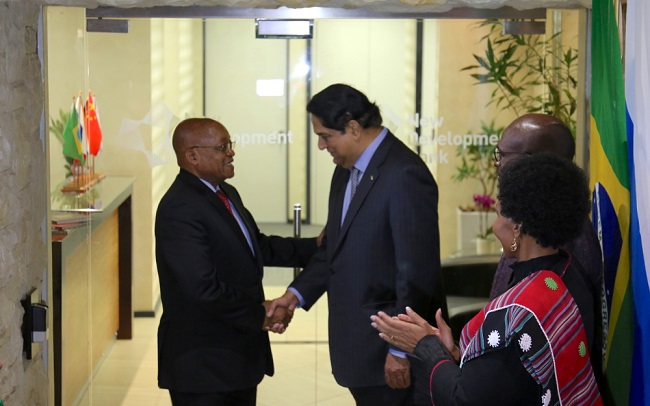BRICS’ bank opens regional center in Africa

South African President Zuma (left) greets NDB boss K.V. Kamath
The New Development Bank (NDB) officially opened its Africa Regional Center (ARC) in Johannesburg, South Africa on Thursday, August 17.
According to a release by the NDB, the bank is aiming to establish the ARC as an important contributor to sustainable infrastructure development in South Africa and as a useful participant in the development agenda of the continent.
The agreement between the government of the Republic of South Africa and the New Development Bank on the hosting of the New Development Bank Africa Regional Centre in the Republic of South Africa was signed by International Relations and Cooperation Minister Maita Nkoana-Mashabane and NDB President K.V.Kamath, in the presence of the President of the Republic of South Africa Jacob Zuma.
“The establishment of the ARC, which is the first regional office of the NDB, is an important milestone for the Bank. It marks the fulfillment of a commitment made by the founders of the Bank in its Articles of Agreement,” said Mr. K.V.Kamath.
“The ARC will be the face of the NDB in Africa. It will progressively undertake a growing range of the Bank’s work, beginning with project identification and preparation,” highlighted NDB President. “We are confident that South Africa will be a significant country of operations for the Bank, especially with our on-the-ground footprint of the ARC,” he added.
“We sincerely appreciate the strong support that we have received from the relevant ministries in the South African Government that have allowed us to reach this milestone,” said Mr. K.V.Kamath.
The ARC’s initial emphasis will be on identification and preparation of sustainable infrastructure and sustainable development projects in South Africa in line with South Africa’s National Development Plan adopted by the Government as a blueprint for future economic and socio-economic development strategy for the country.
The bank’s loans will enhance and complement the available founding sources in South Africa and the region. The NDB is working with the government of South Africa and other strategic partners, including development finance institutions on strengthening its project pipeline, focusing on such sectors as water, transport, energy and urban development.
“The ARC will work closely with the Government, public and private sector agencies, and other relevant stakeholders in South Africa to identify projects that have strong development impact to be supported by the NDB. It will play an important role in preparing these projects so that they can be financed. Subsequently, the ARC will also support the effective and efficient implementation of these projects,” said Mr. K.V.Kamath.
The bank will continue to explore opportunities to raise capital in local currency to meet the borrowers’ demand.
Background Information
The NDB was established by Brazil, Russia, India, China and South Africa to mobilize resources for infrastructure and sustainable development projects in BRICS and other emerging economies and developing countries, complementing the existing efforts of multilateral and regional financial institutions for global growth and development.
To fulfill its purpose, the NDB will support public or private projects through loans, guarantees, equity participation and other financial instruments.
Since starting of its operations in July 2015, the NDB has been focusing on building a strong institutional foundation for the bank’s work. The NDB has progressively put in place the necessary policy and administrative measures and commenced lending and borrowing operations.
To date, the NDB Board of Directors approved seven projects in all member states, for a total of over USD 1.5 billion in the areas of renewable and green energy, and transportation.
In July 2016, the NDB successfully issued the first onshore bond in China for an amount of RMB 3 billion (approx. USD 445 million). The choice to issue green bond as the first capital markets transaction of the Bank was in line with its mandate to promote infrastructure and sustainable development projects and was supported by the fact that all the projects approved in the first half of 2016 were in the green sector.
According to the NDB’s General Strategy: 2017 – 2021, sustainable infrastructure development will be the primary emphasis of the bank’s operations in the next five years.

